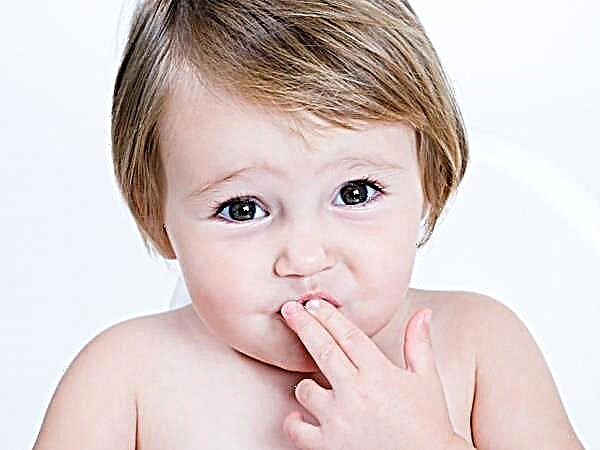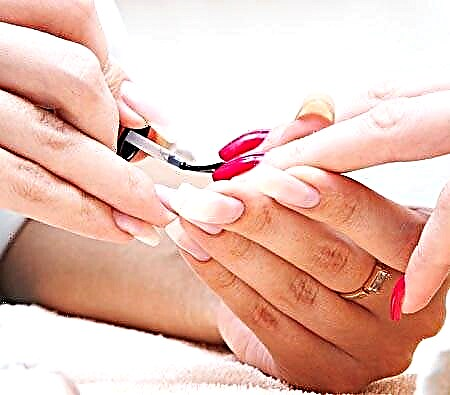
As you know, the need for calm rest and full-fledged restorative sleep in children is great. But the daily "overdose" of various impressions, new knowledge and skills becomes an insurmountable obstacle for the growing man. He cannot sleep peacefully, his sleep is anxious, the baby often cries, his appetite has deteriorated, the child has become worse at school, he is nervous and capricious. All these and many other disturbing features of the child's behavior for parents are a reason to think if the child needs help.

You should not rush to the pharmacy for sedatives and psychostimulants. There are many less toxic and more natural, natural ways to help your child find harmony with himself and the world around him. One of these methods is herbal medicine.
What is herbal medicine?
Phytotherapy is the treatment of a person with medicinal herbs and preparations made from such plants. The ancient Greeks were the first to use herbs to create potions, followed by the Sumerian healers. Herbal medicine was popular at the court of Ivan the Terrible, Catherine II and has survived to this day. Thus, the recipes for many herbal preparations have been tested not even for years, but for millennia. Gone are the days when healers were considered sorcerers and feared. Official medicine has long ceased to argue with herbalists, and often doctors are happy to include herbal medicine in their course of quite traditional treatment.

A nervous, excitable, quickly tired child, a capricious infant or a tired schoolboy ... Herbs can help all of them. You just need to know which soothing herbs and in what way can be used for children.
Herbs that have a calming effect on children:
- St. John's wort,
- Melissa,
- Valerian,
- Mint,
- Plantain,
- Lavender,
- Pine needles,
- Hop,
- Oregano
- Motherwort,
- The sequence.
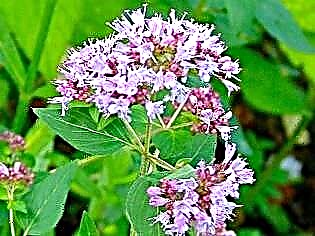

Herbs that are contraindicated in children:
- Broom,
- Celandine,
- Sagebrush,
- Tansy,
- Citrus leaves and peel.
A child can take herbs in several ways: decoctions, teas, infusions, essential oils, soothing phyto baths, lotions, compresses. The choice of a particular herb and the method of preparing a medicine from it depends primarily on the age of the child. Let's consider each age stage separately, with possible problems and options for solving them.

Children from 0 to 1 year old
Usually, medicinal herbs are included in the life of newborns from the first days after discharge from the maternity hospital. Mom and Dad begin to add a little decoction of the series to the baby's bath. This soothes the baby and cleans his delicate baby skin better.
The use of medicinal herbs in baby baths is a common practice. All permitted herbs are used to create infusions that can then be poured into the bathing water. But not at the same time. You can take no more than 4 types of plants at a time.
Also, make sure your baby is not allergic to herbs before starting the procedure. To do this, wipe its handle with a cotton pad dipped in the finished broth. If after 15-20 minutes the skin remains clean, does not turn red, does not swell and does not go spots, you can bathe the child with such a herbal collection.
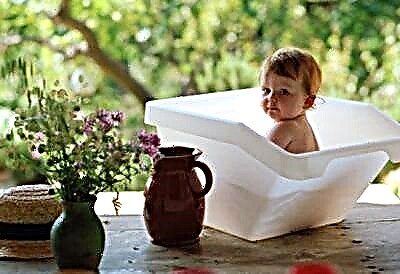
The water temperature for taking healing baths for babies should be no higher than +37 degrees Celsius. Here are some simple recipes for soothing baths for newborns and babies under 1 year old:
- Relaxation bath. Burrow, motherwort and lemon balm. For 10 liters of finished water, use 3 tbsp. tablespoons of the herbal mixture (mix herbs in equal proportions), pour boiling water (about 400 grams). Infuse for about 30 minutes. Strain until the broth is completely free of suspension and add to the bath prepared for bathing. The baby should take it within 10 minutes. Repeat the procedure in two days. The general course of treatment is two months.
- Bath to normalize sleep. For 10 liters of finished water, you need to take needles (about 30 g.), Mint and oregano. Pour boiling water over all the herbs and leave for about an hour. To insist needles, filled with boiling water separately from herbs. Both the one and the other broth should be filtered and poured into the prepared bath. Take for 10 minutes, three times a week. The general course is a month.

Doctors recommend brewing soothing teas from medicinal herbs for newborns not earlier than when the baby is 4 months old. It is at this time that parents will begin to introduce the first complementary foods, and it will be much easier for the baby's body to accept new “products”.
You can make soothing baby teas by yourself, but it is better to buy them at the pharmacy, since there are now several dozen of them presented there.
Choose those that do not contain herbs prohibited for children (see list above), as well as teas that do not contain herbs - potentially strong allergens (such as linden blossom, for example).
Soothing teas based on chamomile, lemon balm, motherwort normalize sleep, relieve hypertonicity, improve digestion and the state of the nervous system.

The most famous herbal teas for children are:
- Fennel tea for newborns. Strengthens the immune system, improves digestion, helps to cope with colic, promotes better absorption of calcium and relieves muscle spasms. Normalizes sleep. It can be bought at a pharmacy (packaged packaging), or you can prepare it yourself. To do this, crush fennel seeds (2 grams) with a teaspoon and pour boiling water over. Cover the dish and let it brew for an hour. Then dilute the broth with boiled water to a volume of 200 ml. Giving fennel tea should be started gradually, from 1 teaspoon a day, bringing up to 6 teaspoons a day by the end of the week.

- Chamomile tea. To prepare such tea, you need pharmaceutical chamomile flowers. Pour boiling water over about 5 grams of the herb and let it brew for 40-45 minutes. Bring to a volume of 250 ml. Give a teaspoon twice a day. This tea has anti-inflammatory and deep sedative effects. Makes baby sleep sound.

- Herbal tea "Babushkino basket". This is a ready-made fennel tea that can be bought at any pharmacy. The box contains 20 sachets. Helps to cope with colic and has a mild laxative effect, soothes and relaxes the baby. The daily dose of such tea for crumbs up to 1 year should be equal to the volume of one feeding. For children after 12 months, the dosage can be increased to 200-300 ml.
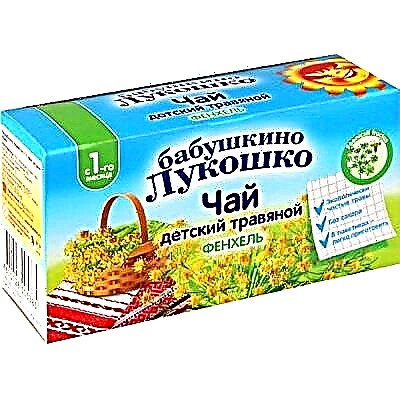
- Mint soothing tea. This tea is easy to make and is sure to please your little one. You will need 2 tablespoons of mint, 1 tablespoon of hop cones, 1 tablespoon of valerian root. All herbal ingredients must be mixed, crushed as fine as possible and boiled with boiling water. Water needs a little less than half a glass. Insist for about half an hour. For children under 1 year old, give 4-5 times a day, a teaspoon. Babies from 1 to 3 years old - two to three tablespoons five times a day. For preschoolers, 1 glass three times a day.

In the following video, an experienced pharmacist will tell you which soothing teas and herbs are available at the pharmacy.
Children aged 1-2 years
Children who are one year old, in addition to all of the above herbs, can additionally be given valerian, linden flowers, oregano.
For babies who are already 2 years old, you can safely add St. John's wort to the already allowed assortment.

Children aged 3-9 years
Babies who have crossed the first serious age limit at 3 years old can add lavender to tea. From 3-4 years old, you can use aromatic oils when bathing, however, you should refrain from "exotic" representatives of this family - citrus fruits, tea and sandalwood, etc. It is better to give preference to plant oils that are characteristic of the natural strip in which you live.
A pine bath has an excellent calming effect on the nerves. For her, you can use needles, pre-brewed and infused, and pine essential oil. When adding essential oils, strictly follow the dosage indicated on the package. An extra two or three drops "for flavor" can cause an allergic reaction in a child.
For children of preschool and primary school age, soothing herbs can be used in drops and tablets (when it comes to homeopathic medicines).

You can make teas, as well as decoctions for taking baths, as far as your imagination is enough, the main thing, as in the case of medicinal soothing herbal baths, is not to mix more than 4 herbs at the same time.
Characteristics of Some Soothing Herbs
- Peppermint. Thanks to the presence of menthol, this plant is a real antibacterial weapon. Lotions with mint decoction relieve itching and inflammation. The herb has a mild calming effect, and at the same time strengthens the bronchi and lungs. You need to take it in the form of tea or bath, preferably 30 minutes before the baby goes to bed.

- Valerian root. It is an excellent sedative, which also has a pronounced sedative and analgesic effect. Plus, valerian root is an excellent herbal antidepressant. You can take it by adding it to tea. Valerian is not recommended for newborns, but you can wrap a piece of root in gauze and put the crumbs near the crib. He will sleep better.

- Melissa. It is a "broad spectrum" plant. Melissa, in addition to soothing properties, has a beneficial effect on the work of the heart, strengthens blood vessels, and normalizes digestion. It can be taken as part of tea, as part of a bath broth.

- Motherwort. Everyone knows about its sedative properties, even people who are very far from medicine. When adding motherwort to tea or a bath for a child, it is also useful to know that this plant has anticonvulsant, tonic and diuretic properties.

- The sequence. Basically, this herb has a cosmetic effect, but at the same time and a slight sedative. A bathing sequence is applied. After a course of baths with it, children prone to diathesis, diaper rash, and skin allergies are effectively soothed.

- Oregano. This herb is ideal for making soothing tea, phyto bath, and compresses. It relieves nervous tension, has a general strengthening effect. Oregano is often used as a filler for soothing pillows.

Soothing Herbal Pillow
The popular scented pillows should be used with caution to soothe children. The fact is that it is generally undesirable for young children (up to 7 years old) to sleep on such pillows all night, the constant inhalation of the aroma of herbs can cause an allergic reaction even in an adult. It is better for children to limit themselves to short rest breaks on such a pillow (no more than 1 hour).
Soothing pillows can be purchased ready-made, or you can sew them yourself, combining in bags made of natural fabric only those herbs that you consider useful and necessary for your child, taking into account his problems and needs.

The author of the following video will tell and show how and from what you can make your own soothing herbal pillow for sleep.
General Tips for Using Soothing Herbs for Children
- Buy herbs and herbal preparations from pharmacies. If you are not a professional herbalist, it is better to postpone the collection of medicinal plants on your own until the herbs are needed by adults. Children's herbs must be clean, selected and tested. This is no place for experimentation.
- Don't rely on the quick effects of soothing herbs. All herbal remedies act cumulatively, i.e. you need to drink tea or a decoction systematically, and take baths with soothing herbs in a day or two until the course of treatment is complete.
- Consult your pediatrician and pediatric neurologist before using soothing herbs.

The following music can also help cope with overexcitement.
How to choose a soothing tea, see the next video.

